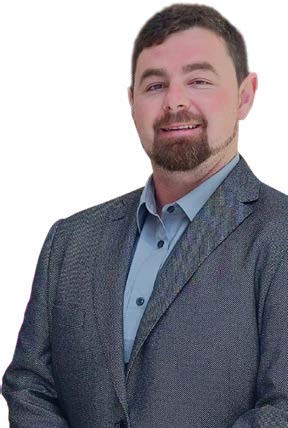- Perspective – August 2025
- NDE Advert
- GPS Round Up
- Sassda News : Sixty Minutes with Stainless Webinar: Full Report
- Sassda News : Tariffs with a Purpose
- EMV Africa Advert
- State of the Stainless Steel Nation
- Focus Feature
- Professional Profile – Craig Bateman
- Technical Case Study – Stainless Steel in Hydrometallurgy
- Member News – Astra Industrial Innovations
- Member News – African Sinks
- Market Intelligence – North Africa Rising
- Sassda News
- Member News
From Field to Factory: Craig Bateman on Analytical Innovation in Stainless Steel
 Our Professional Profile feature showcases emerging leaders in the industry by giving them them a platform to share their insights and experiences. In this issue, we profile Innov-X-Africa Sales Director Craig Bateman, who has built a career transforming technical data into practical solutions. His work spans from remote field sites to advanced testing technologies, helping industries across Africa make smarter, faster decisions. His expertise plays a vital role in stainless steel operations where precision, mobility, and speed are essential.
Our Professional Profile feature showcases emerging leaders in the industry by giving them them a platform to share their insights and experiences. In this issue, we profile Innov-X-Africa Sales Director Craig Bateman, who has built a career transforming technical data into practical solutions. His work spans from remote field sites to advanced testing technologies, helping industries across Africa make smarter, faster decisions. His expertise plays a vital role in stainless steel operations where precision, mobility, and speed are essential.
Please provide some background on where you come from, your school and tertiary education and where you first started working
My journey began with a solid foundation in elemental analysis sciences and a keen interest in how the world works. Early on, I found myself drawn to the practical applications of analytical tools in industrial environments, as my father and his father were involved in the industry and gave me an insight most kids will never know. My work has always revolved around providing solutions. Those formative experiences, whether in labs or on-site in northern Namibia, shaped my deep appreciation for how accurate information drives smarter decision-making in complex operations.
What are some of the key work experiences or projects, that you have worked on that have challenged you but also helped to shape your skills, experience and career advancement?
Several stand out. I’ve worked on refining Python scripts to process chemical test results, with an emphasis on robust error handling and clear state management. I’ve also supported field-based technicians using handheld analytical technologies, helping bridge the gap between laboratory precision and field practicality. Every challenge, whether technical or interpersonal, has sharpened my ability to connect people with decisions in real-world environments.
What would you say are the biggest i. work and ii. life lessons you have learnt thus far in your life?
From a work perspective, I’ve learned that true reliability isn’t just about hardware. It’s about ensuring processes are transparent and resilient. Whether in communication or compliance, integrity matters and brings people back to you for solutions.
On a personal level, I’ve come to value the transformative power of feedback. Growth doesn’t come from comfort. It comes from asking hard questions, embracing tough lessons, and remaining open to change, and having the right people around you can make all the difference.
What is your current position and how would you describe a typical day on the job?
My role sits at the crossroads of technical consulting and field application. I design intelligent workflows for chemical and metallurgical testing, provide technical support for handheld XRF and mobile OES units, and collaborate with partners to tailor solutions for industries like mining,
recycling, manufacturing and processing.
A typical day might include doing training on handheld XRF in the morning, running a live demo in a refinery by noon, and reviewing compliance protocols on benchtop OES with a client in the afternoon. It’s varied, fast-paced, and always rewarding.
How are portable analytical technologies impacting South Africa’s stainless steel value chain?
They’re transforming it. Tools like Vanta handheld XRF analysers allow for instant alloy verification, drastically reducing lab bottlenecks and uncertainty in fast-moving environments. From production to inspection, quality assurance to export control, these devices empower technicians to make faster, smarter decisions. That means better traceability, improved safety, and stronger regulatory compliance, especially valuable in Africa’s dynamic industrial landscape.
How important is technical knowledge in ensuring stainless steel success in African projects?
It’s essential. The effectiveness of stainless steel in industrial applications relies heavily on how well it’s understood and handled. In Africa, we face two key challenges: a skills gap or ‘brain drain’ in applied materials science and limited hands-on access to advanced instrumentation due to economic instability.
But there’s also immense opportunity. Industry academic partnerships, remote training platforms, and regional support hubs can uplift technical knowledge, making sure our people are not just users, but confident operators and innovators.
What are the biggest challenges in South Africa’s stainless steel sector, and how can they be addressed?
Operational costs, energy instability, and skills migration are pressing issues. But we can counter them with collaborative innovation. Accelerating low-emission production technologies, investing in local R&D, and fostering mentorship programs across generations can reposition our industry for both competitiveness and resilience. We must move from reactive strategies to proactive, data-driven solutions.
What innovations in stainless steel excite you most, and where do you see future growth?
Smart stainless steel, integrating sensors for live structural feedback, is incredibly exciting. Likewise, the rise of 3D printing with high-performance alloys is opening doors in aerospace, healthcare, and renewable energy.
Future growth lies in sectors that require durability, hygiene, and sustainability: water infrastructure, food processing, pharmaceuticals, and green energy systems. Stainless steel will be central to Africa’s next wave of development, and I’m excited to be part of that journey.

